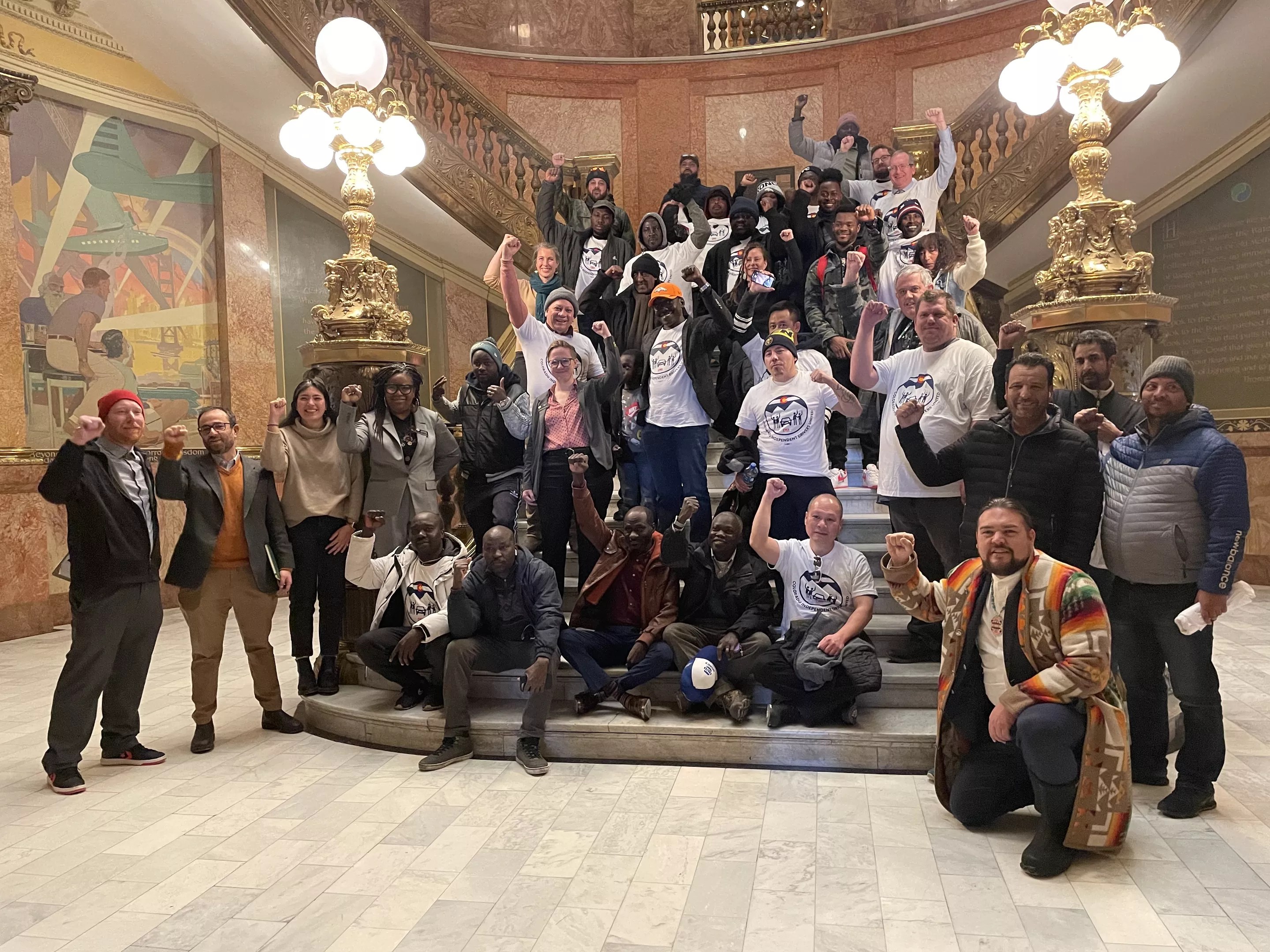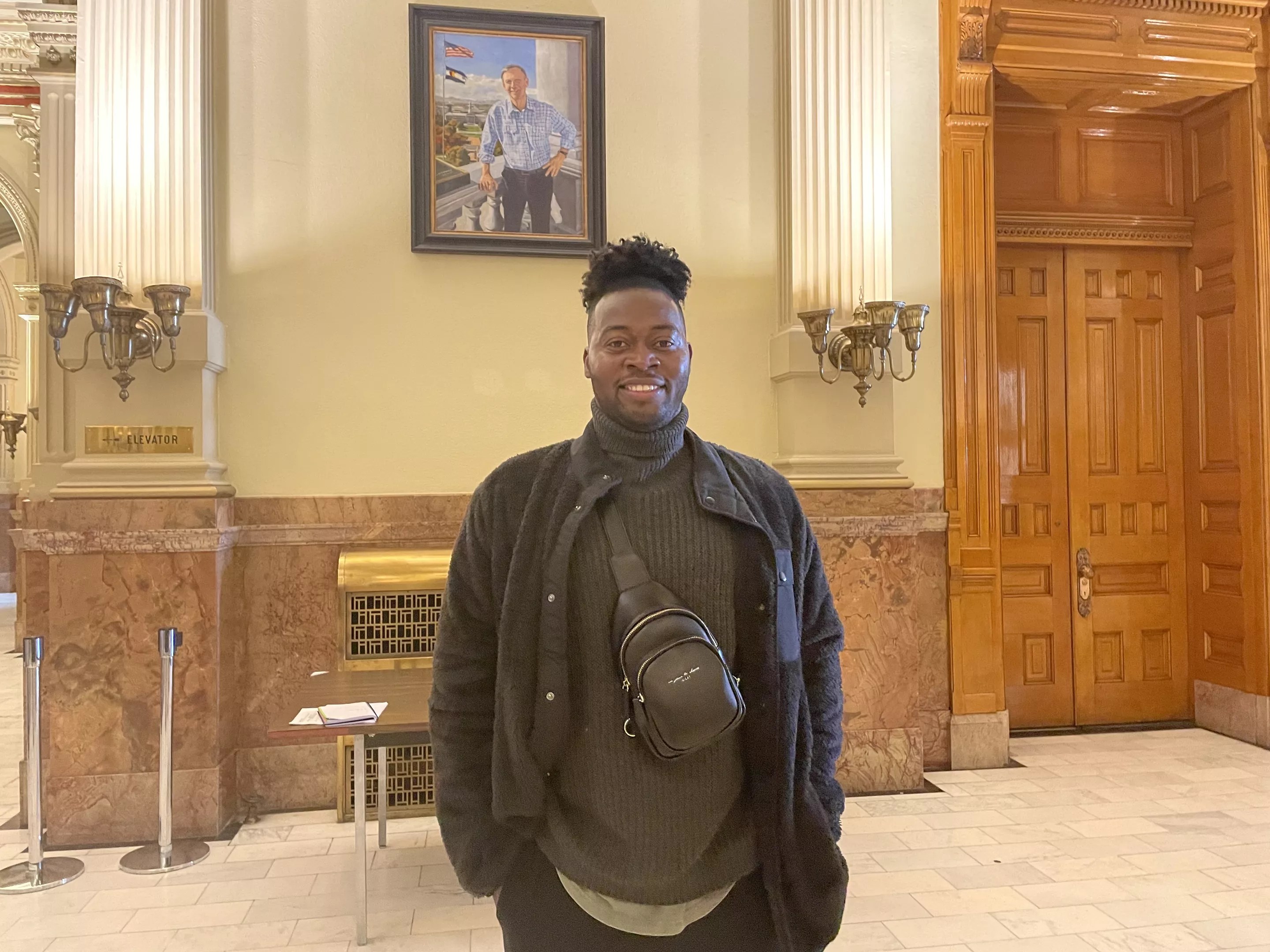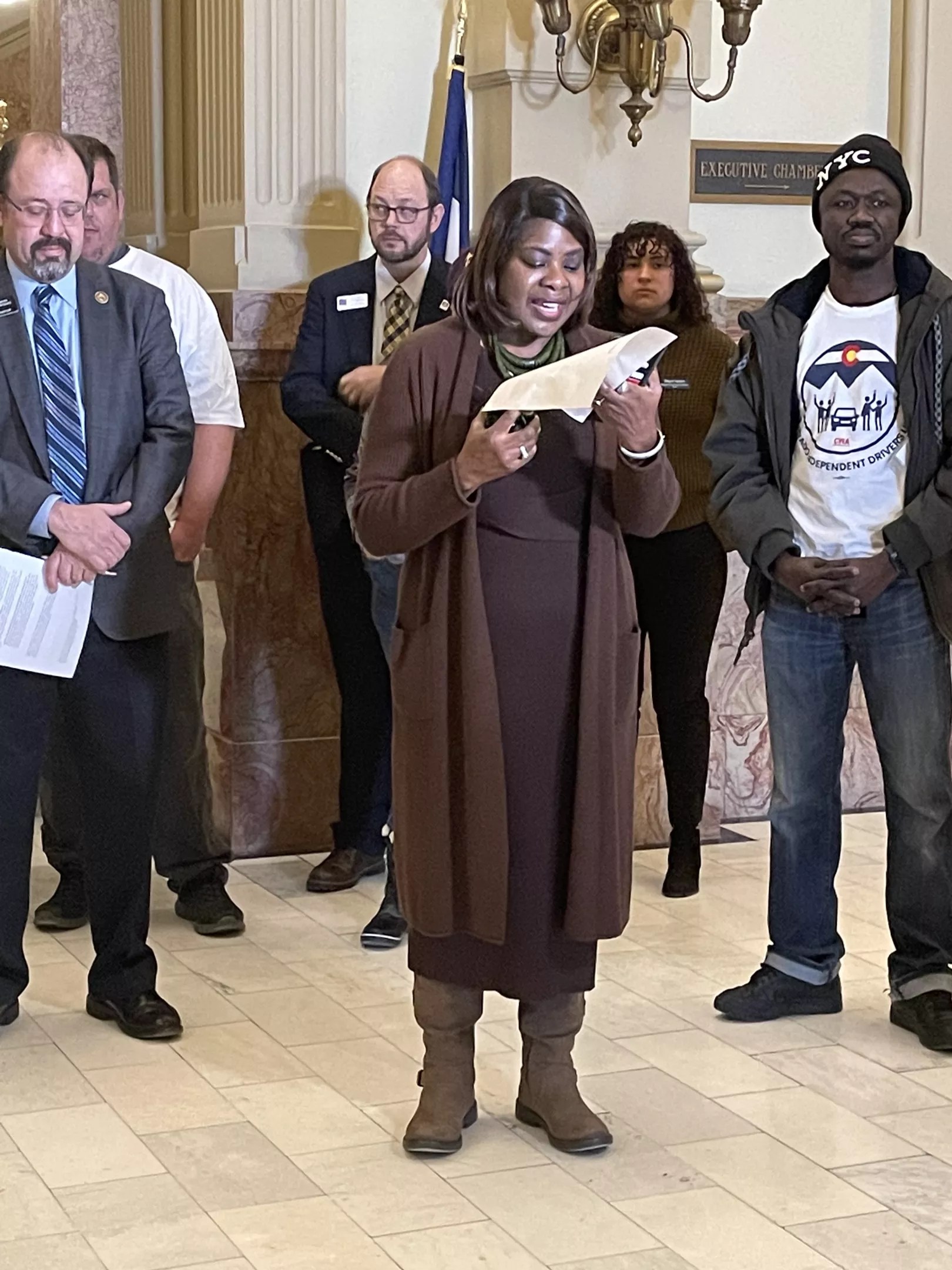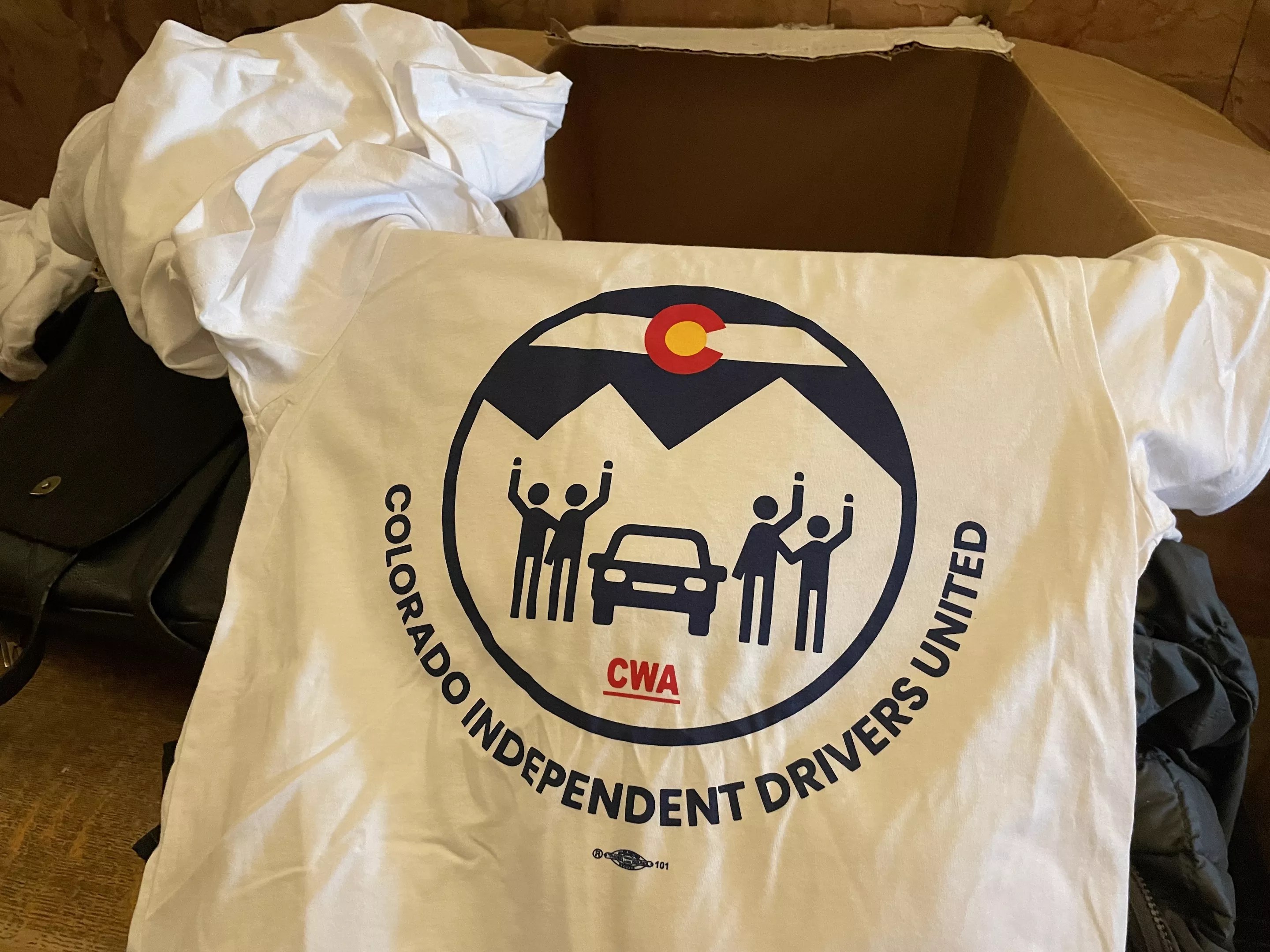
Catie Cheshire

Audio By Carbonatix
Like pretty much everything else, the price of using rideshare and delivery apps such as Uber, Lyft and DoorDash has gone up in recent years, much to the dismay of those who use them.
And those who take people and products from point A to point B want everyone to know that the increase in price isn’t the driver’s fault. For the most part, they make less than they used to. Some have even joined the effort to promote legislation that would show the customer and the driver exactly how little of the cost of each ride goes to the person making the trip happen.
Senator Robert Rodriguez and representatives Jennifer Bacon and Stephanie Vigil, the latter of whom is a gig driver herself, are now sponsoring a Gig Work Transparency Bill that would show those costs in full.
“We’re concerned about this because, while they lowered our income, they also raised the prices for the consumers that we take to and from their places of work, their homes, to the airport or wherever they need to go,” Samuel Pena Perez, a rideshare driver, said at a rally announcing the legislation in the west foyer of the Colorado State Capitol building on January 30.
Showing support at the rally was Erick Ametefe, who has been driving for Uber full-time for eight years. He says that when he started, he would always make about $25 when he drove people to the airport. Now, he says, it’s closer to $15 – yet customers are paying more than ever.
“We’re not charging you more,” Ametefe says of the drivers. “It’s all in the app platform. I don’t get to see how much you get charged. If I know how much you get charged, then I might be able to relate to your pain.”
He asks people how much they’re paying for their ride and tries to talk with them about what he makes in order to increase transparency. If the Gig Work Transparency Bill is successful, he won’t have to do that anymore: All of the information will be available on the app to the driver and rider for each ride.

Erick Ametefe has driven for Uber for eight years.
Catie Cheshire
The legislation directs the Division of Labor Standards and Statistics to adopt rules that require disclosures about payments made to drivers and procedures regarding driver termination, two main topics that concern the Colorado Independent Drivers United, a union of rideshare workers that is lobbying for the legislation.
“We love driving for a living, and we love having flexibility and control over our schedule,” lobbyist and DoorDash driver Sandra Parker-Murray said at the rally. “However, our ability to earn a living wage shouldn’t be at the mercy of secret algorithms that are designed to maximize profits.”
The legislation requires apps to disclose ride destinations and fares to drivers before they accept a job. Currently, drivers often know the distance of the trip but not the actual destination, causing them to end up across town or even in different cities without being able to consider the consequences before consenting to that trip.
The Gig Work bill is aimed at giving drivers the information they need to act as fully informed independent contractors. Like most independent contractors of all types, they provide the equipment and do all of the maintenance needed to work for one of these apps, but because the apps don’t give them all of the information, they don’t have access to the full picture the way other types of gig workers do.
“We’re bringing transparency to these platforms – and just to be clear, that’s what they promised us from the beginning,” Vigil said. “The whole point here is for you to run your own work, work off the platform, make informed decisions about what jobs you want to take and which ones you don’t want to take. We’re building some accountability into that system so that those promises are actually realized.”
To that end, the legislation also requires the apps to share offers made to other drivers for the same ride and the rate other drivers were offered before the driver accepts the ride.
It would also require rideshare companies to give weekly updates to each driver about their pay before expenses, tips before expenses, an estimate of their expenses, their hourly net pay, and the hourly minimum wage in the jurisdictions in which the drivers performed their tasks, so that drivers will have a better understanding of their pay.

Sandra Parker-Murray is a DoorDash driver who helped lead the charge at the State Capitol.
Catie Cheshire
“At this point, Uber is part of how people live. It’s not going away,” Ametefe says. “We do the maintenance. We pay for insurance. We do everything else. Uber does not do any of that. So why do they get to keep 70 percent, sometimes 80 percent of the trip?”
Those weekly reports would help balance out how much money the companies take, the drivers theorize, with Colorado Independent Drivers United calling for companies to take a maximum of 25 percent of each trip.
Another issue CIDU has raised is what it sees as random and discriminatory deactivations of drivers without explanation. The legislation tackles that, too, requiring the Division of Labor Standards and Statistics, along with the Public Utilities Commission – which regulates ridesharing companies – to establish rules under which termination is warranted and creating a system for drivers to appeal terminations that don’t fall under those rules.
If companies don’t follow the new regulations, the bill proposes fines of $100 to $1,000, depending on the circumstances.
“It’s in the company’s best interest to have this transparency, to make their workers want to do this work, to know how they’re getting paid, to know their rights, and to be part of the conversation that has developed,” Rodriguez said at the rally. “So it’s a great thing that we’re running this bill.”
Lyft, one of the companies in question, says it already does much of what the bill addresses.
“Fair deactivations and pay transparency are important issues,” Lyft said in a statement through senior communications manager CJ Macklin. “That’s why we have an appeals process in place for when drivers feel they have been unfairly deactivated. We also introduced Upfront Pay in Colorado last year, so drivers could have more ride and earnings information ahead of accepting a ride.”
Lyft also provides a weekly pay summary of its earnings and how much riders paid. The company says it has no set take rate because of incentives and tips that contribute to driver pay and prefers its weekly pay summary to the idea of showing pay breakdowns for each ride. Its summary doesn’t attach amounts paid to specific rides, but shows that information in aggregate because driver pay is decoupled from rider pay.
“We look forward to engaging with lawmakers on these topics and exploring how to strengthen them further in a way that doesn’t inadvertently hurt our rider and driver communities,” Lyft continues.
Uber similarly plans to engage with lawmakers and drivers on this legislation, saying it supports many of the ideas in the bill. However, in a statement shared through spokesperson Harry Hartfield, the company voiced concerns about safety and “destination discrimination.”
The company also needs to be able to deactivate drivers who are unsafe or intimidate riders, Uber says. The CIDU drivers agree, but say in most cases it’s not true that deactivated drivers fit those criteria, and it’s often not clear what the criteria is.
Additionally, Uber worries that if drivers know where a rider is going before they accept the ride, people traveling to inconvenient places may have a harder time finding a ride. Drivers say they deserve that information, because their safety and ability to make a living are important, too.
“If the drivers are not there, you can just have an app and then nobody’s gonna drive,” Ametefe says of why the companies should agree to what’s in the legislation. “If you’re not compensating the right amount to drivers, then it’s not worth it to them, who are the ones actually keeping the whole platform running.”
Ametefe says it’s gotten more frustrating to drive over the years, and he questions whether it’s worth it at times. For example, surge bonuses for drivers have gone to a flat rate rather than a multiplier of the usual cost, which has made surges as costly for customers but less profitable for drivers. Uber says that change, made a few years back, helped ensure that drivers would still get paid extra even if a surge ended before they picked up the passenger.

CIDU gave out shirts at the rally.
Catie Cheshire
Other longtime drivers, such as Daniel Ortega – who has been driving for Uber full-time for three years – say bonus pay for hitting a certain number of rides each week has gotten harder to reach. He uses those bonuses to pay for his gas. Uber says that is not the result of an overall company change but instead is related to Ortega’s specific experience.
That randomness is what drivers hope to change with this legislation.
“We’re here to put our foot down and put an end to all this,” Ortega says.
The drivers emphasize that their work benefits the community, but that they can’t keep doing it if the situation continues to be unfair.
“It’s really important that we recognize that these are the kinds of jobs that we all agreed just a few years ago are, in fact, essential,” Vigil said. “When COVID hit our communities and it was a scary time, and we were struggling to maintain public health and safety, a lot of people were asked to stay home and work, and all the rest of us who can’t do that brought things to everybody. … If there’s anybody who deserves a fair shake at this point, it’s all those folks we just agreed are essential.”